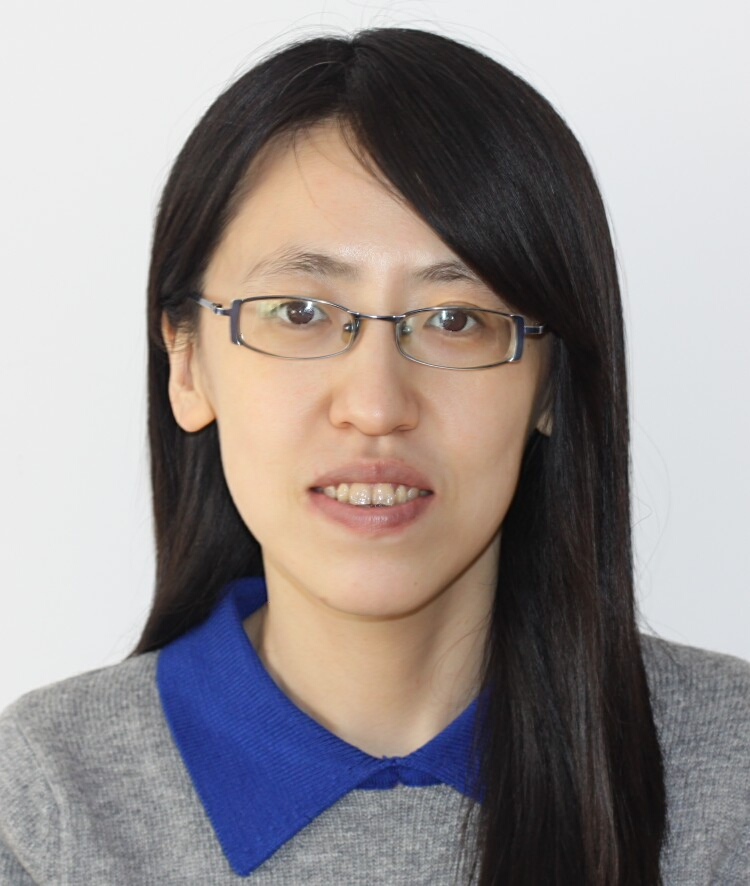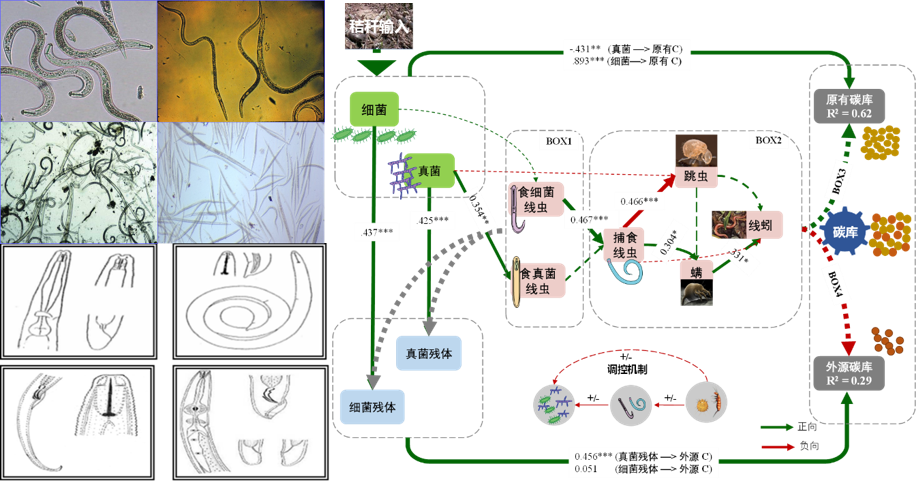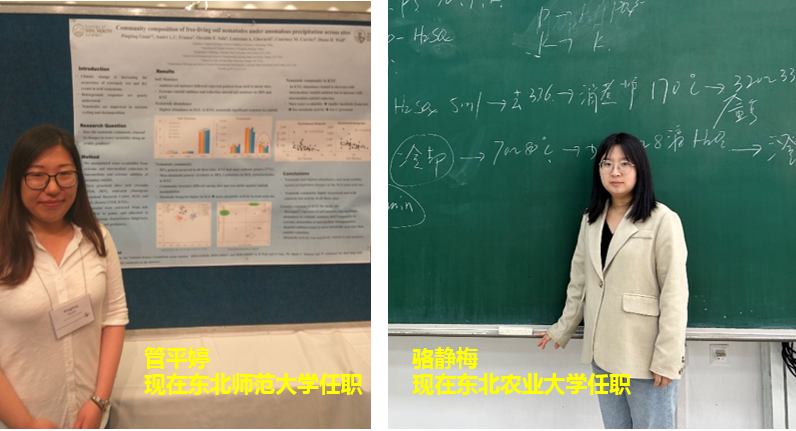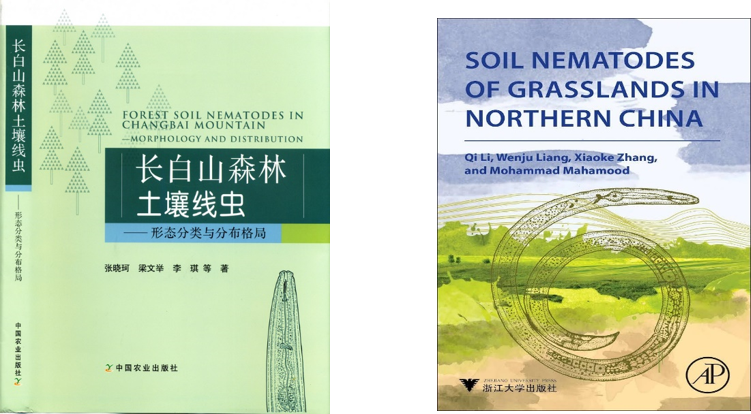科研人员

张晓珂
张晓珂 女,1978年4月生,博士。现任永利娱高ylg060net研究员、博士生导师,主要从事土壤生态学研究。主持并完成国家自然科学基金面上项目4项、重点项目课题1项、青年基金项目1项,中国博士后科学基金面上资助项目1项,中国科学院知识创新工程重要方向项目专题1项,辽宁省博士启动基金项目1项,获沈阳市人才资源开发专项奖励基金;目前主持国家重点研发计划子课题1项、区域创新发展联合基金项目课题1项、辽宁省应用基础研究计划项目1项、沈阳市科学技技术计划项目1项。发表文章70余篇,其中SCI论文40余篇,国际刊物10篇,出版专著3部。
学习经历:
2000.9~2003.7 沈阳农业大学作物栽培与耕作学专业,获硕士学位
2003.9~2006.7 中科院沈阳应用生态研究所土壤学专业,获博士学位
国内工作经历:
2006.7~2008.12 永利娱高ylg060net生态学专业博士后
2008.12~2013.11 永利娱高ylg060net,任副研究员
2013.12~至今 永利娱高ylg060net,任研究员
国际交流合作:
2008.12.14~17 赴以色列参加“Drylands, Deserts and Desertification”学术会议,并做题为“Distribution pattern of soil nematode communities in stabilized and active sand dunes in northeastern Inner Mongolia, China”的墙报
2012.8.10~21 赴美国参加线虫学会第51届年会,并做题为“Impact of Organic Amendments on Nematode Distribution Within Aggregate Fractions in an Aeolian Sandy Soil”的报告
2015.3.24~2016.3.23 赴美国加州大学戴维斯分校,农业与环境科学学院,昆虫与线虫系,高级访问学者

主要研究方向:
土壤生态,土壤线虫生态,土壤食物网,土壤动物在养分循环中的生态功能

主持项目:
1. 国家重点研发计划子课题“辽河平原褐土区土壤退化的生物学机制与阻控机理研究”(编号2022YFD1500601-3),2022.11-2027.10
2. 国家自然科学基金面上项目“农田生态系统秸秆还田对氮在土壤微食物网内转化的影响机制”(编号:41977054),2020-2023
3. 国家自然科学基金面上项目“农田生态系统土壤微食物网对有机碳输入的响应机制”(编号:41771280),2018-2021
4.国家自然科学基金面上项目“科尔沁沙丘人工林下生物土壤结皮对土壤线虫群落的影响”(编号:31270669),2013-2016
5. 国家自然科学基金面上项目“长白山温带森林土壤线虫多样性及生物指示作用研究”(编号:31170577),2012-2015
6. 国家自然科学基金青年项目“科尔沁沙地沙丘土壤线虫时空分布格局研究”(编号:30700109),2008-2010
7. 国家自然科学基金重点项目课题“长期施肥条件下土壤团聚体内线虫群落分布特征”(编号:31330011-课题3)
8. 区域创新发展联合基金项目课题“辽河平原玉米花生间作对土壤生物健康的影响机制”(编号:U22A20501-课题4),2023-2026
9. 辽宁省科技计划课题“黑土地健康保育与作物多样性高效栽培模式研究”(编号:2022JH2/101300184),2022-2025
10. 沈阳市科技计划项目“沈阳黑土区农田土壤健康诊断评价与功能提升研究” (编号:213552),2021-2024
已毕业的研究生:
王要磊、管平婷、程云云、郑海睿、骆静梅、寇新昌、张乐聪、刘笑彤

目前在读研究生:
田艺佳、高理想、王骁、郭慷、杨明昊、唐子贻
发表文章:
1. Liu XT, Liang SW, Tian YJ, Wang X, Liang WJ, Zhang XK*. 2023. Effect of land use on soil nematode community composition and co-occurrence network relationship. Journal of Integrative Agriculture. DOI: 10.1016/j.jia.2023.11.019
2. Liu XT, Zhang XK*, Tian YJ, Li YB, Du XF, Liu HW, Yosef S, Liang WJ*. 2023. Microfauna community assembly and cascading relationship with microflora in cropland ecosystems along a latitudinal gradient. Agriculture, Ecosystems and Environment. 357: 108678
3. Kou XC, Morriën E, Tian YJ, Zhang XK*, Lu CY, Xie HT, Liang WJ, Li Q*, Liang C. 2023. Exogenous carbon turnover within the soil food web strengthens soil carbon sequestration through microbial necromass accumulation. Global Change Biology. 29: 4069-4080
4. Zhang ZY, Li BX, Wang H, Zhang XK*, Cui SY, An TT, Fu SF, Mahamood M, Zhang D, Wang JK. 2023. The fungal feeding channel of soil micro-food web contributes to transformation of exogenous C into soil C- a 13C labeling microcosm experiment. Land Degradation & Development. 34(2): 466-477
5. Liu HW, Du XF, Li YB, Han X, Li B, Zhang XK, Li Q*, Liang WJ*. 2022. Organic substitutions improve soil quality and maize yield through increasing soil microbial diversity. Journal of Cleaner Production. 347: 131323
6. Liu HW, Zhang XK*, Zhang GZ, Kou XC, Liang WJ*. 2022. Partial organic substitution weakens the negative effect of chemical fertilizer on soil micro-food webs. Journal of Integrative Agriculture. 21(10): 3037-3050
7. Luo JM, Zhang XK*, Kou XC, Xie HT, Bao XL, Mohammad Mahamood, Liang WJ*. 2021. Effects of residue mulching amounts on metabolic footprints based on production and respiration of soil nematodes in a long-term no-tillage system. Land Degradation and Development. 32: 2383-2392
8. Zhang ZY, Wang H, Wang Y, Zhang XK*, Zhao TH, Mahamood M.2021. Organic input practice alleviates the negative impacts of elevated ozone on soil microfood-web. Journal of Cleaner Production. 290: 125773.
9. Kou XC, Ma NN, Zhang XK*, Xie HT, Zhang XD, Wu ZF*, Liang WJ, Li Q, Howard Ferris. 2020. Frequency of stover mulching but not amount regulates the decomposition pathways of soil micro-foodwebs in a no-tillage system. Soil Biology and Biochemistry. 144: 107789
10. Kou XC, Zhang XK*, Bia W, Cai Q, Wu ZF, Li Q, Liang WJ. 2020. Exploring N fertilizer reduction and organic material addition practices: Examining their alleviating negative effect of fertilization on nematode food web in cropland. Land Degradation & Development. 31: 2952– 2961
11. Zhang GZ, Kou XC, Zhang XK*, Bai W, Liang WJ*. 2020. Effect of row spacings on soil nematode communities and ecosystem multifunctionality at an aggregate scale. Scientific Reports.10: 4779
12. Yuan ZQ, Ali A, Ruiz-Benito P, Jucker T, Mori AS, Wang SP, Zhang XK, Li H, Hao ZQ, Wang XG, Loreau M. 2020. Above- and below-ground biodiversity jointly regulate temperate forest multifunctionality along a local-scale environmental gradient. Journal of Ecology. 108 (5): 2012-2024
13. Guan PT, Zhang XK*, Yu J, Cheng YY, Li Q, Walter S. Andriuzzi, Liang WJ*. 2018. Soil microbial food web channels associated with biological soil crusts in desertification restoration: The carbon flow from microbes to nematodes. Soil Biology & Biochemistry. 116: 82-90
14. Cui SY, Liang SW, Zhang XK, Li YB, Liang WJ*, Sun LJ, Wang JK, Bezemer TM, Li Q*. 2018. Long-term fertilization management effects the C utilization from crop residues by the soil micro-food web. Plant and Soil, 429: 335-348
15. Zhang ZY, Liang SW, Wang JK*, Zhang XK*, Mohammad Mahamood, Yu J, Zhang XP, Liang AZ, Liang WJ. 2018. Tillage and crop succession effects on soil microbial metabolic activity and carbon utilization in a clay loam soil. European Journal of Soil Biology. 88: 97-104
16. Zhang XK, Ferris Howard*, Mitchell Jeffrey, Liang WJ. 2017. Ecosystem services of the soil food web after long-term application of agricultural management practices. Soil Biology & Biochemistry. 111: 36-43
17. Zhang ZY, Zhang XK, Md.Mahamood, Zhang SQ, Huang SM, Liang WJ*. 2016. Effect of long-term combined application of organic and inorganic fertilizers on soil nematode communities within aggregates. Scientific Reports. 6: 31118
18. Zhang ZY, Zhang XK, Xu MG*, Zhang SQ, Huang SM, Liang WJ*. 2016. Responses of soil micro-food web to long-term fertilization in a wheat-maize rotation system. Applied Soil Ecology. 98: 56-64
19. Zhang XK, Guan PT, Wang YL, Li Q, Zhang SX, Zhang ZY, Bezemer TM, Liang WJ*. 2015. Community composition, diversity and metabolic footprints of soil nematodes in differently-aged temperate forests. Soil Biology & Biochemistry.80: 118-126
20. Guan PT, Zhang XK*, Yu J, Ma NN, Liang WJ*. 2015. Variation of soil nematode community composition with increasing sand-fixation year of Caragana microphylla: Bioindication for desertification restoration. Ecological Engineering. 81:93-101
21. Zhang ZY, Zhang XK*, Zhao JX, Zhang XP, Liang WJ. 2015. Tillage and rotation effects on community composition and metabolic footprints of soil nematodes in a black soil. European Journal of Soil Biology. 66: 40-48
22. Zhang XK, Wu X, Zhang SX, Xing YH, Wang R, Liang WJ*.2014. Organic amendment effects on aggregate-associated organic C, microbial biomass C and glomalin in agricultural soils. Catena. 123: 188-194
23. Zhang XK, Li Q, Liang WJ*, Zhang M, Bao XL, Xie ZB. 2013. Soil Nematode Response to Biochar Addition in a Chinese Wheat Field. Pedosphere, 23(1): 98-103
24. Zhang XK, Li Q, Zhu AN, Liang WJ*, Zhang JB, Steinberger Y. 2012. Effects of tillage and residue management on soil nematode communities in North China. Ecological Indicators. 13(1): 75-81
25. 刘笑彤,田艺佳,刘汉文,梁翠影,姜思维,梁文举,张晓珂*. 2022. 下辽河平原农田土壤线虫群落组成的季节变化研究.生物多样性. 30(12):2222
26. 梁文举*,董元华,李英滨,张晓珂,李琪,武志杰. 2021. 土壤健康的生物学表征与调控. 应用生态学报. 32(2):719-728
27. 郑海睿,骆静梅,刘笑彤,刘亚军,赵晓霞,解宏图,张晓珂*. 2019. 秸秆还田量对植物寄生线虫群落的影响. 生态学杂志. 38:1725-1731
28. 张晓珂,梁文举,李琪*. 2018. 我国土壤线虫生态学研究进展和展望. 生物多样性,26(10): 1060-1073
29. 程云云,孙涛,王清奎,梁文举,张晓珂*. 2018. 模拟氮沉降对温带森林土壤线虫群落组成和代谢足迹的影响. 生态学报. 38:475-484
30. 骆静梅,张晓珂,梁文举. 2021. 土壤线虫采集、标本制作与数据分析. Bio-101: e1010621. DOI: 10.21769/BioProtoc.1010621
31. 刘笑彤,田艺佳,刘汉文,梁翠影,姜思维,梁文举,张晓珂*. 2022.下辽河平原农田土壤线虫群落组成的季节变化研究.生物多样性. 30(12):127-135
32. 王骁,梁思维,田艺佳,刘笑彤,梁文举,张晓珂*. 2023. 稳定同位素技术在土壤食物网研究中的应用. 应用生态学报,34(10):2861-2870. DOI: 10.13287/j.1001 -9332.202310.013.
33. 谢致敬,刘相钰,孙晓铭,刘继亮,刘占锋,张晓珂,陈军,杨效东,朱波,柯欣,吴东辉. 2023. 中国土壤动物多样性监测网络建设、进展与展望. 31(12): 23365
出版专著2部
1. 张晓珂, 梁文举, 李琪 主编. 2013. 长白山森林土壤线虫—形态分类与分布格局. 中国农业出版社
2. Li Q, Liang WJ, Zhang XK, Mahamood M. 2017. Soil Nematodes of Grasslands in Northern China. Zhejiang University Press. Academic Press is an imprint of Elsevier


